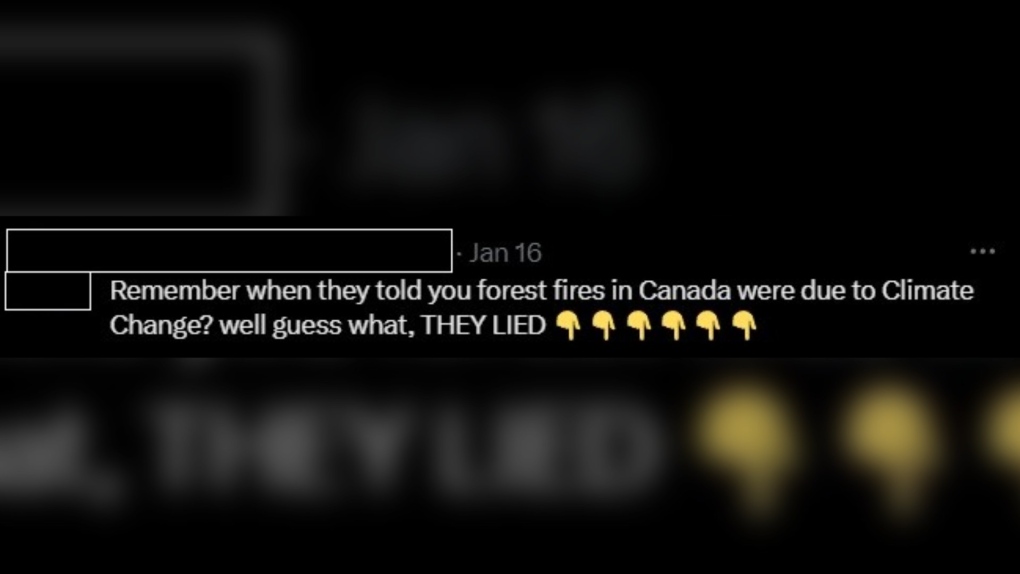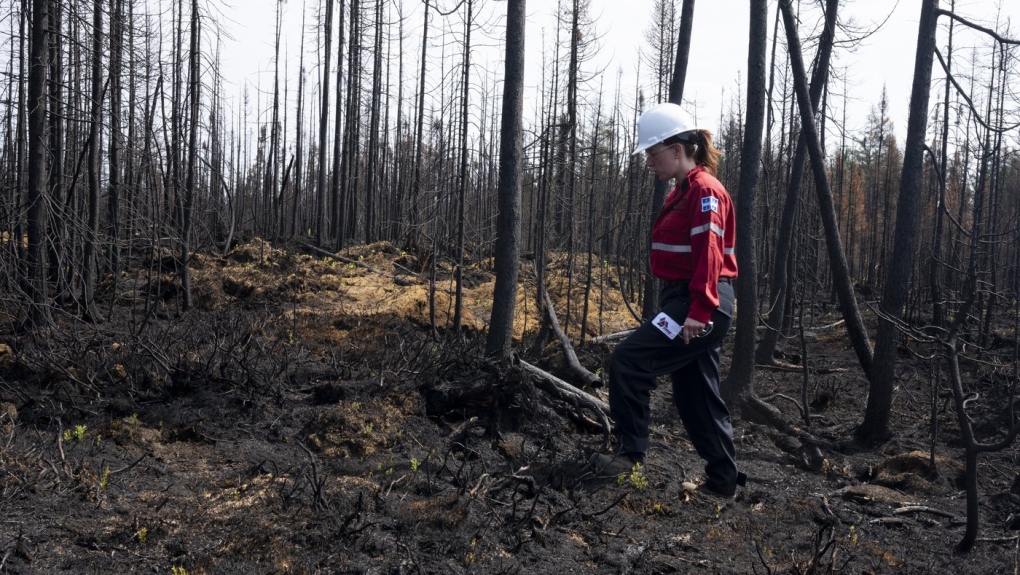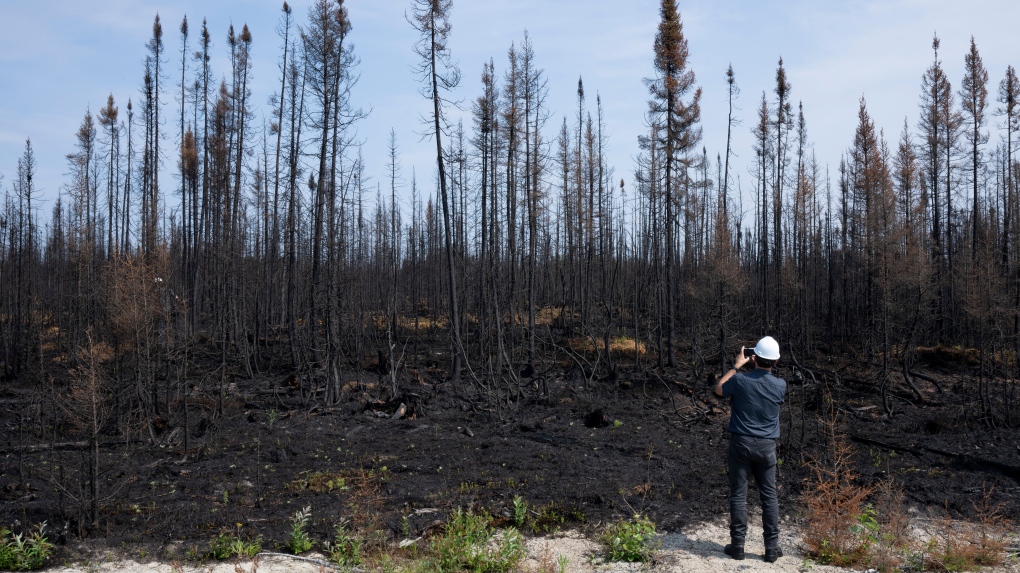'Alarming' disinformation about Quebec wildfires spreads after arsonist's guilty plea
The headline — "Quebec man pleads guilty to setting 14 forest fires, burning hundreds of hectares" — was shocking, but the reaction to it spreading on social media was even more troubling to climate change experts.
Soon after news articles were published about Brian Paré, who admitted on Monday to setting fires that forced hundreds of people from their homes last year, people on X, formerly known as Twitter, were quick to accuse the government and the media of lying to them.
 A screenshot of a post on X in reaction to a Quebec man pleading guilty to setting forests on fire in 2023. (CTV News/Twitter.com)
A screenshot of a post on X in reaction to a Quebec man pleading guilty to setting forests on fire in 2023. (CTV News/Twitter.com)
When will the media "admit the summer of fires was a lot to do with arson and little to do with 'climate change'. Never because they love to fear monger," one person posted on X.
 A screenshot of a post on X in reaction to a Quebec man pleading guilty to setting forests on fire in 2023. (CTV News/Twitter.com)
A screenshot of a post on X in reaction to a Quebec man pleading guilty to setting forests on fire in 2023. (CTV News/Twitter.com)
Another person posted, "Looks like it wasn't climate change that was starting the fires."
Many of the comments were replies to posts from other accounts with tens of thousands of followers.
In reality, 38-year-old Paré ignited fires in central Quebec that burned a little more than 900 hectares, Crown prosecutor Marie-Philippe Charron confirmed to CTV News.
To put that into perspective, Quebec's forest fire prevention office, SOPFEU, said more than 700 wildfires burned 4.5 million hectares across the province last year.
That would mean Paré's actions accounted for about 0.02 per cent of the wildfires in 2023.
"It's very alarming that someone who spreads climate disinformation online goes to this length to make a point that is in no way based on reality, on science. So that's really unfortunate," said Andréanne Brazeau, a climate policy analyst with Montreal-based environmental group Equiterre.
At the same time, Brazeau said, it's also not that surprising to see such posts spreading on social media because the discourse online is more and more polarized today.
"There is also a certain tiredness, a certain denialism to some climate news. Because it's a very, very big issue and a lot of people unconsciously are not going to face the truth," she said. "It is an issue that is too overwhelming, too threatening. So that's something we see a lot in environmental psychology."
 Climate change has made summers like the kind that led to Quebec's disastrous wildfire season at least seven times more likely to happen again, says a new scientific analysis. Society of Protection of Forests from Fire prevention agent Melanie Morin walks through an area of burned forest in the area surrounding Lebel-sur-Quevillon, Que., on Wednesday, July 5, 2023. THE CANADIAN PRESS/Adrian Wyld
Climate change has made summers like the kind that led to Quebec's disastrous wildfire season at least seven times more likely to happen again, says a new scientific analysis. Society of Protection of Forests from Fire prevention agent Melanie Morin walks through an area of burned forest in the area surrounding Lebel-sur-Quevillon, Que., on Wednesday, July 5, 2023. THE CANADIAN PRESS/Adrian Wyld
'INTELLECTUAL DISHONESTY'
According to court documents, Paré set fires in the Chapais and Chibougamau areas, roughly 500 kilometres northwest of Quebec City, between May 29 and Sept. 5, 2023.
There is no evidence that anyone else committed large-scale arson in Quebec forests last year.
Charron said she's not aware of any other cases, and when reached on Wednesday, Quebec provincial police said they "have no other suspect."
 Yan Boulanger is a research scientist who studies the effects of climate change on forest ecosystems. (CTV News)
Yan Boulanger is a research scientist who studies the effects of climate change on forest ecosystems. (CTV News)
Some of the dubious posts on X were shared thousands of times.
To suggest that last year's historic wildfires can be summed up as the actions of one arsonist underscores the level of "intellectual dishonesty" that propagates on social media, according to Yan Boulanger, a research scientist at Natural Resources Canada.
"The fact that we had this number of fires [last] year were only caused by arson, of course that's not true," he said. "Talking about the fires that this guy lit up in the boreal forest, I mean, they are representing a very, very small fraction of what burned actually and most of those fires were natural."
 A reporter takes a photo of trees damaged by fire during a tour near Lebel-sur-Quevillon, Que., Wednesday, July 5, 2023. Quebec's forest fire prevention agency says the area burned by wildfires this year was greater than the previous 20 years combined. THE CANADIAN PRESS/Adrian Wyld
A reporter takes a photo of trees damaged by fire during a tour near Lebel-sur-Quevillon, Que., Wednesday, July 5, 2023. Quebec's forest fire prevention agency says the area burned by wildfires this year was greater than the previous 20 years combined. THE CANADIAN PRESS/Adrian Wyld
SOPFEU concluded that 99.9 per cent of the fires were caused by lightning strikes.
Boulanger, who got his PhD at the Université du Québec à Rimouski, researches the effects of climate change on forest ecosystems.
He was part of an international team of 16 scientists that led a study on Quebec's record-breaking wildfire season.
The study, conducted by the U.K.-based World Weather Attribution group, found that climate change made the extreme intensity of forest fires at least twice as likely as preindustrial climate.
Boulanger attributed the intensity of the forest fire season to a cocktail of extreme "fire-prone" conditions: hotter, drier weather.
"It doesn't mean that it never occurred in the past, but the probability to observe those kinds of extremes are more likely now just because we are injecting more energy into the atmosphere because the conditions themselves are much more fire-prone than we had in the past," he said. "And this will continue if we are not mitigating the effects of climate change."
CTVNews.ca Top Stories

Trump threatens to try to take back the Panama Canal. Panama's president balks at the suggestion
Donald Trump suggested Sunday that his new administration could try to regain control of the Panama Canal that the United States “foolishly” ceded to its Central American ally, contending that shippers are charged “ridiculous” fees to pass through the vital transportation channel linking the Atlantic and Pacific Oceans.
Man handed 5th distracted driving charge for using cell phone on Hwy. 417 in Ottawa
An Ottawa driver was charged for using a cell phone behind the wheel on Sunday, the fifth time he has faced distracted driving charges.
Wrongfully convicted N.B. man has mixed feelings since exoneration
Robert Mailman, 76, was exonerated on Jan. 4 of a 1983 murder for which he and his friend Walter Gillespie served lengthy prison terms.
Can the Governor General do what Pierre Poilievre is asking? This expert says no
A historically difficult week for Prime Minister Justin Trudeau and his Liberal government ended with a renewed push from Conservative Leader Pierre Poilievre to topple this government – this time in the form a letter to the Governor General.
opinion Christmas movies for people who don't like Christmas movies
The holidays can bring up a whole gamut of emotions, not just love and goodwill. So CTV film critic Richard Crouse offers up a list of Christmas movies for people who might not enjoy traditional Christmas movies.
More than 7,000 Jeep SUVs recalled in Canada over camera display concern
A software issue potentially affecting the rearview camera display in select Jeep Wagoneer and Grand Cherokee models has prompted a recall of more than 7,000 vehicles.
'I'm still thinking pinch me': lost puppy reunited with family after five years
After almost five years of searching and never giving up hope, the Tuffin family received the best Christmas gift they could have hoped for: being reunited with their long-lost puppy.
10 hospitalized after carbon monoxide poisoning in Ottawa's east end
The Ottawa Police Service says ten people were taken to hospital, with one of them in life-threatening condition, after being exposed to carbon monoxide in the neighbourhood of Vanier on Sunday morning.
New York City police apprehend suspect in the death of a woman found on fire in a subway car
New York City police announced Sunday they have in custody a “person of interest” in the early morning death of a woman who they believe may have fallen asleep on a stationary subway train before being intentionally lit on fire by a man she didn't know.


































